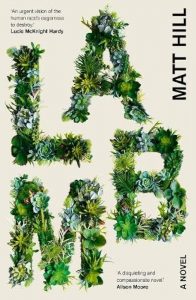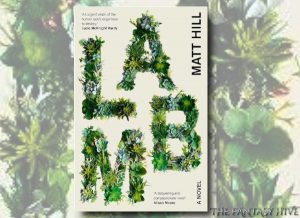LAMB by Matt Hill (BOOK REVIEW)
“Leigh, finally noticing Boyd, turned and smiled absently. But she couldn’t find a way to shed her startled expression, and her eyes were bloodshot. There were too many possibilities, too many worries, and Boyd could see she felt them as acutely as he did. In turn, he saw his parents’ own responsibility for him in a new light; recognized some sliver of what it meant to have to care completely. The anxiousness of it. The desire to get everything right. The dread for things that might never happen. Had he been like a bomb going off in the middle of their life, too?”
Matt Hill has already established himself as one of the most exciting voices in modern speculative fiction, with novels such as Zero Bomb (2019) and The Breach (2020). Lamb (2023), his latest novel and first for indie publishers Dead Ink Books, is another triumph of speculative imagination. Hill finds the strange, the beautiful and the human in the decaying environs of the north of Britain in the near future, and Lamb is perhaps the most profoundly empathetic of his novels yet, a moving and haunting meditation on familial responsibility in a terminally unstable world. In Hill’s novels, genre itself is unstable, as the Weird, science fiction, horror and folk tales shift and merge into new surreal textual landscapes. But throughout the bleak and broken futures that Hill sees for us just around the corner, his characters never lose their essential warmth and humanity, even as they struggle to comprehend the forces that dwarf and destroy them.
 Boyd’s father Dougie is a lorry driver, until, radicalized by losing his job to AI, he dies in a suicide attack on his employers. Fifteen-year-old Boyd moves north with his mother Maureen and their cat Red to Sile, an old decaying Pennine market town. Maureen and Boyd try to start afresh, but it soon becomes clear that Maureen’s grief has unlocked a horrifying transformation. As their house is consumed by mutant moss, Boyd escapes to the town dump, where Leigh, a similarly disaffected and lonely teenager, works sifting through the rubbish for things to sell. But then the two of them find a baby girl, which they name Lamb, and their lives are uprooted forever as the secrets of Maureen and Boyd’s past return.
Boyd’s father Dougie is a lorry driver, until, radicalized by losing his job to AI, he dies in a suicide attack on his employers. Fifteen-year-old Boyd moves north with his mother Maureen and their cat Red to Sile, an old decaying Pennine market town. Maureen and Boyd try to start afresh, but it soon becomes clear that Maureen’s grief has unlocked a horrifying transformation. As their house is consumed by mutant moss, Boyd escapes to the town dump, where Leigh, a similarly disaffected and lonely teenager, works sifting through the rubbish for things to sell. But then the two of them find a baby girl, which they name Lamb, and their lives are uprooted forever as the secrets of Maureen and Boyd’s past return.
It is difficult to describe Lamb’s plot without getting into specifics; rather, the novel should be experienced by the reader so that they, like Boyd, can slowly piece together the pieces of Hill’s elaborate puzzle until, at the end, one can stand back and appreciate this remarkable exploration of the post-human condition. Even more than his previous books, Lamb does not pamper the reader with infodumps, but rather invites them to experience the strangeness of the novel as an end in and of itself. This works because Hill is a remarkable writer. The novel is dense with atmosphere, and indeed one of the beautiful things about it is the way the novel’s landscape and the interior psychic landscape of its characters merge and overlap. Lamb is suffused with surrealist imagery of structures collapsing, bursting into moss and fungal growths, boundaries between individuals and places dissolving. Boyd’s familiar British working-class home turns from a place of stability and familiarity into something uncanny and terrifying, both through the physical transformations enacted by Maureen’s biology and by the uprooting experience of grieving for one parent while the other parent suffers a severe mental breakdown.
This process of the familiar and comforting disintegrating into something frightening and strange happens not just in the microcosm of Boyd’s household, but in the macrocosm of near-future Britain. Hill’s previous novels have explored how the pressures of climate change and the changes in the political landscape leading up to Brexit and their consequences have been reshaping Britain in dystopian ways. Whereas both Zero Bomb and The Breach brought these concerns to the foreground, in Lamb they are no less important to the novel, but instead form the psychic backdrop against which Boyd, Maureen and Lamb’s stories play out. This is a Britain where the working class are being driven out of jobs by AI, where a boy like Boyd and his mother can slip through the cracks of social services and higher education, where scavenging in a landfill provides an environment of security and stability. And although Lamb is not a post-apocalyptic novel, it definitely creates the sense of a society in collapse, where the only things we can rely on are our relationships with each other. It would be a mistake to describe Lamb as a Brexit or Covid novel, yet like modern masterpieces Conquest (2023) by Nina Allan and M. John Harrison’s The Sunken Land Begins To Rise Again (2020), this is a novel that brilliantly uses the Weird and the speculative to describe what it’s like to live in a modern UK uniquely shaped by these ongoing catastrophes. Lamb takes place in a world where everything feels slightly out of joint, where everything seems beset by decay and collapse, where one’s life feels vastly out of one’s control by forces one can’t begin to comprehend.
When we can no longer count on the world around us to provide protection and stability, all we have left is the way we treat each other. This is the message at the core of Lamb. Despite his isolation, Boyd is utterly defined by his relationships – his relationship with his distant, traditionally Northern masculine father; his relationship with his mother, which through their shared experience of world-shattering grief and his mother’s mental breakdown shifts the balance of responsibility between who is looking after and protecting who; his relationship with Lamb as he learns firsthand the difficulties of caring for another being who is entirely dependent on you. Hill expertly weaves through these different relationships to explore the networks of care and dependency that exist within family units, and the burdens and rewards of responsibility and care between parents and their children. This provides Lamb with its deeply human core, making it a moving exploration of the lengths people will go to for each other despite the bleakness of their surroundings.
And on top of that, there’s the body horror. Lamb is suffused with incredible imagery of buildings and bodies collapsing and decaying into each other, human forms dissolving and mutating into something else. Lamb is an exemplary work of speculative fiction that effortlessly delves into the uncanny and the horrific to describe a truly modern state of being. In some contexts this contributes to the bleakness of Lamb’s world, but ultimately Hill finds a sense of peace and acceptance in this change – perhaps in order to survive in our harsh new realities, we need to be able to let go of being human in order to retain our humanity.
Lamb by Matt Hill is out now from Dead Ink Books. You can order your copy on Bookshop.org

